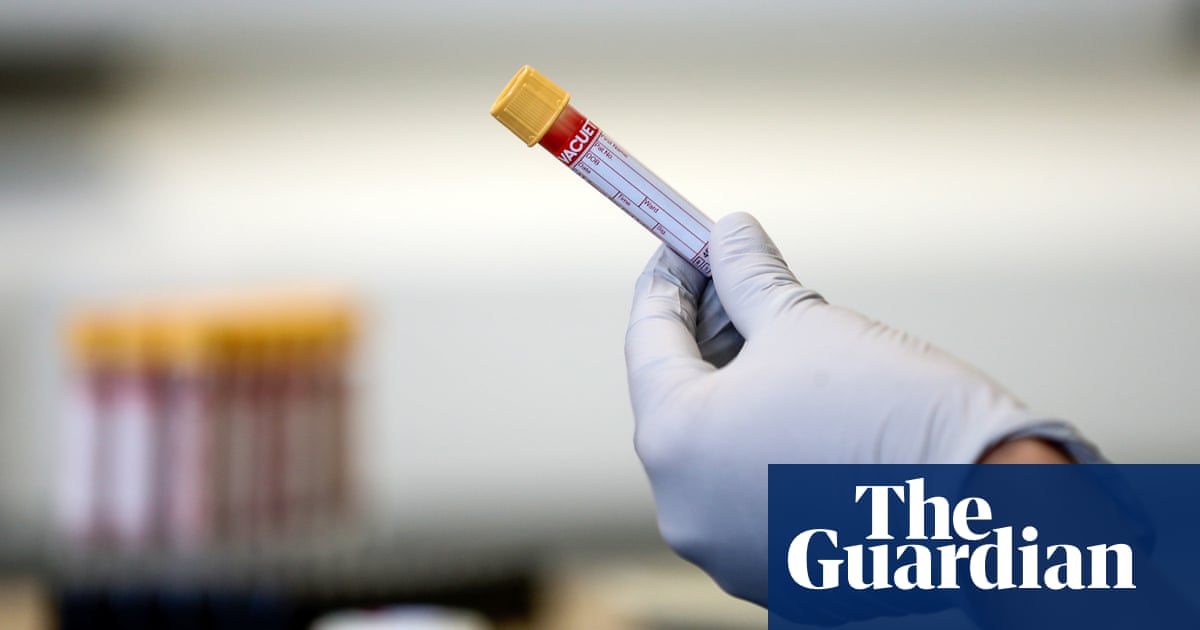
The possibility of simple blood tests to help diagnose Alzheimer’s disease faster has been given a boost after researchers revealed evidence that they can rival costly brain scans or painful lumbar punctures for accuracy.
Recent studies have brought the possibility of reliable blood tests for dementia closer to becoming a reality. A £5m project was launched by researchers in the UK last year with the goal of enabling people to be diagnosed in seconds on the NHS within five years.
Now, researchers have evaluated a commercial blood test that is already on the market, revealing it could be just as good as, if not surpass, lumbar punctures and expensive scans at detecting signs of Alzheimer’s in the brain.
Dr Nicholas Ashton, first author of the study, from Gothenburg University, Sweden, said the results had important implications, given research has shown the medicines donanemab and lecanemab can slow cognitive decline in Alzheimer’s patients.
“If you’re going to receive [the new drugs], you need to prove that you have amyloid in the brain,” he said. “It’s just impossible to do spinal taps and brain scans on everyone that would need it worldwide. So this is where the blood test [has] a huge potential.”
But Ashton added the tests could still be useful even if such drugs were not available – as is the case in the UK.
“It could potentially say that this is not Alzheimer’s disease and it could be another type of dementia,” he said, which would help to direct the patient’s management and treatment routine.
In the journal Jama Neurology, Ashton and colleagues explained that the protein p-tau217 was a well-known biomarker for changes in the brain associated with Alzheimer’s disease.
Previous work has shown it can be used to differentiate Alzheimer’s from other neurodegenerative disorders and to detect the disease even in the case of mild cognitive impairment.
Measurements of this protein in the blood have shown promise as a diagnostic tool for Alzheimer’s. However, there is limited availability of such tests for research and clinical use.
In an attempt to improve availability, the researchers evaluated an existing commercial blood test for p-tau217, called ALZpath.
ALZpath makers are in discussions with labs in the UK to launch it for clinical use this year, and one of the co-authors, Henrik Zetterberg, is making the assay available for research use as part of the “biomarker factory” at UCL.
The research involved analysis of data from different trials in the US, Canada and Spain, and involved 786 people – including those with and without cognitive impairment.
In all three trials, patients had either a lumbar puncture or an amyloid PET scan to identify signs of amyloid and tau proteins – hallmarks of Alzheimer’s disease. The team then compared the findings with results from the ALZpath blood test.
The researchers said their analysis showed the blood test was as accurate as tests based on lumbar punctures, and was superior to brain atrophy assessments, in identifying signs of Alzheimer’s.
“80% of individuals could be definitively diagnosed on a blood test without any other investigation,” Ashton said.
David Curtis, an honorary professor at University College London’s Genetics Institute, welcomed the findings and suggested the blood tests could be used to screen everyone over 50 years old every few years, in much the same way as they are now screened for high cholesterol.
However, Ashton urged caution, noting it had not yet been shown that Alzheimer’s drugs were effective in people without symptoms.
“If you do have amyloid in the brain at 50 years of age, the blood test will be positive,” he said. “But what we recommend and what the guidelines recommend with these blood tests, is that these are to help clinicians – so someone must have had some objective concern that they have Alzheimer’s disease or their memory is declining.”
Dr Richard Oakley, an associate director of research and innovation at the Alzheimer’s Society, said the study was a welcome step in the right direction.
“It shows that blood tests can be just as accurate as more invasive and expensive tests at predicting if someone has features of Alzheimer’s disease in their brain,” he said.
“Furthermore, it suggests results from these tests could be clear enough to not require further follow-up investigations for some people living with Alzheimer’s disease, which could speed up the diagnosis pathway significantly in future.”
But he stressed that further work was needed.
“We still need to see more research across different communities to understand how effective these blood tests are across everyone who lives with Alzheimer’s disease,” he said.
Health - Latest - Google News
January 23, 2024 at 08:06PM
https://ift.tt/GsiaTDS
Blood test could revolutionise diagnosis of Alzheimer’s, experts say - The Guardian
Health - Latest - Google News
https://ift.tt/hNt2UXR
Bagikan Berita Ini














0 Response to "Blood test could revolutionise diagnosis of Alzheimer’s, experts say - The Guardian"
Post a Comment